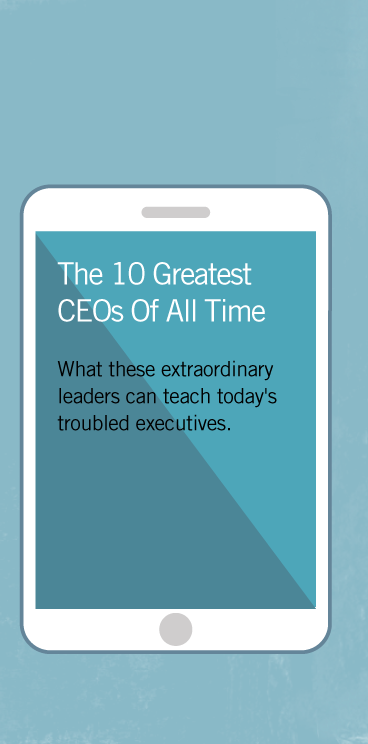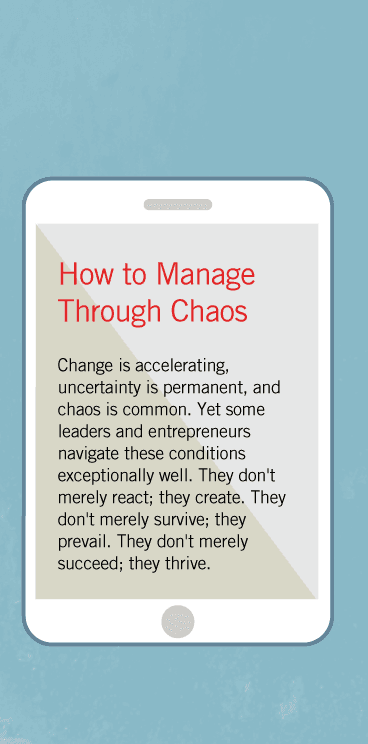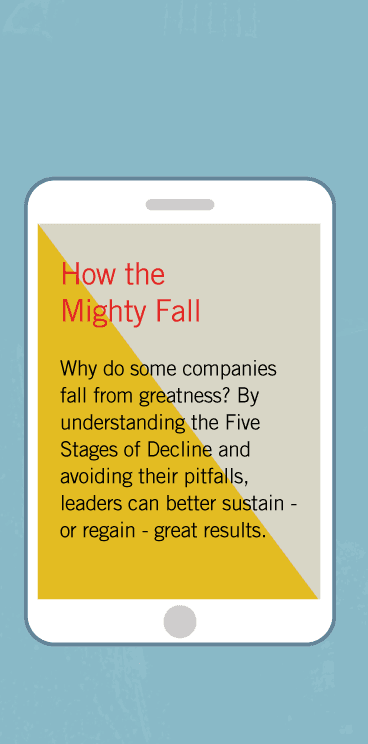The Wizard, King, and Hobbit of Business
The truth is, we love epic adventures that unfold gradually, allowing us to become lost in the people and their stories. From Darth Vader to Harry Potter, from Achilles to Odysseus, from Bilbo to Frodo, there is something primal in our obsession with the multivolume epic. Even in nonfiction, larger-than-life individuals just cannot be stuffed into a single volume. Manchester's biography of Churchill, Caro's Johnson, Sandburg's Lincoln—they hold our attention precisely because they are long enough to do the job.
I began thinking, "Has there ever been a great business trilogy?"
I wanted to find an epic adventure of real people transformed by a hero's journey. I found only one. It's the story of a father who builds an empire, a reluctant son who battles against his father before inheriting the empire and taking it to greatness, and a stranger who shows up in the nick of time to save all that the father and son built. It's a story that spans nine decades and is enmeshed in the sweep of history, from World War I through the Great Depression, World War II, the rise of America, the go-go 1960s, the technology explosion, and the dawn of a new post-September 11 world. The trilogy of IBM—three extraordinary books, each composed by a different author—is populated by characters as bold and daring and ultimately flawed as any in literature, beginning with a fascinating individual who, in middle age, found his life and career shattered.
Part I: The Rise of the King
Five days after his 38th birthday, Thomas J. Watson Sr. awoke to read a banner headline, "NCR Men Indicted by Federal Grand Jury." There, in the second paragraph, in a long list of names, jumped out the horrific sight of the name Watson. Along with 30 other executives, Watson had been nailed for criminal antitrust violations, part of a scheme conceived and orchestrated by his mentor John Henry Patterson. Out of work and carrying the stigma of the NCR scandal, he had to start with less than zero.
In terms of how people respond to crushing setbacks in life, there are three types. There are those who never fully recover. There are those who get their lives back to normal. And there are those—like Thomas J. Watson Sr.—who turn calamity into a defining event from which they emerge stronger than before.
I asked Kevin Maney, author of The Maverick and His Machine (J. Wiley & Sons, 2003), for his assessment of Watson's inner motivations for building IBM into a great company. The primary drives, concluded Maney, were not money, power, or fame—although they did play a role—but a quest for something that added up to more than all of these combined: redemption.
Watson Sr. reminds me of the main character in Joseph Conrad's novel Lord Jim. Early in the story, Jim finds himself first mate on a ship badly damaged at sea. With a squall bearing down, the captain and crew abandon ship, leaving 800 religious pilgrims to their deaths. The crew returns to port, telling a tale of how the ocean destroyed the ship, only to look out the window one day to see the very same ship pulled back into port. Ashamed, Jim seeks out a remote trading post where he dedicates his life to becoming a courageous warrior leader in a tribal village (hence Lord Jim), seeking redemption for his act of cowardice.
Similarly, Watson Sr. sought out a remote little firm, became its idealistic leader, and dedicated his life to building a role-model company revered not just for its success but equally for its fanatical adherence to core values. He built IBM brick by brick from an agglomeration of small enterprises with the innocuous name of The Computing-Tabulating-Recording Company (CTR). Watson Sr. did for corporate culture what the founders of the United States did for capitalist democracy—he invented its modern model and proved that it could work in practice.
Yet Watson Sr. became a figure so cultlike as to create a company wholly dependent on his direction. In fact, IBM would have likely become a mere footnote in industrial history had it not been for one huge stroke of luck: The genetic lottery gave the king of IBM a prince of immense capabilities. Just one problem: The prince had neither the confidence nor the inclination to become king.
Part 2: The Tortured Prince
The Princeton director of admissions flipped through a file on his desk, glowering at the pages. After a long pause, he looked across the desk at Thomas J. Watson Sr. and simply said, "Mr. Watson, I am looking at your son's record, and he is a predetermined failure." It was just one more early life setback described by Thomas J. Watson Jr. in his memoir, Father, Son & Company (Bantam, 1990), written with Peter Petre. He'd failed in high school—taking six years to graduate at the age of 19, with terrible grades. He'd failed to make the baseball team, the football team, or the hockey team. His one arena of success lay in rowing crew, setting the stage for a lifelong love of being on water. His father finally pulled strings to get young Tom into Brown, garnering a ringing endorsement from the officer of admissions: "He's not very good, but we'll take him."
Little wonder young Tom doubted he could fulfill his destiny to take over IBM. In reading his remarkably honest text, one gets the feeling that Watson Jr. would rather have spent his life flying airplanes and taking adventure trips on small boats than running IBM. He was like the prince of a nation who did not feel qualified to be king. (Imagine the Prince of Wales saying, "I'm sorry, Mom, but I just don't think I'm up to being king of England. How about I go climb the Himalayas, and we hire a professional manager instead?")
The turning point came in World War II, when Watson Jr. worked for Air Corps Major General Follett Bradley. Like thousands of young soldiers, he gained confidence from the responsibility placed on his shoulders ("If I blow it here, the plane will crash, and I'll kill all my comrades. . . ."). After the war, Watson Jr. planned to become an airline pilot; he'd simply never believed he had what it took to take over IBM from his legendary father. "Really?" asked a surprised Bradley as they drove to a meeting in the spring of 1945. "I always thought you'd go back and run the IBM company."
Stunned, Watson Jr. stared out the car window and finally summoned the courage to ask the one question he'd never dared: "General Bradley, do you think I could run IBM?" Bradley uttered two words that would change the course of Tom's life and the trajectory of industrial history: "Of course."
Watson Jr. lived in terror of letting his father down. After his father's death in 1956, Watson Jr. spent the next 14 years of his life proving—to himself, to the world, and to his dead father—that he was up to the task. He drove himself and IBM, never allowing rest. He turned IBM to computers. He bet the company on the IBM 360—the largest privately financed commercial project undertaken to that point in history, requiring more resources than the Manhattan Project to develop the atomic bomb in World War II. Under Watson Jr., IBM grew more than tenfold, while profits multiplied 18 times. Carrying the burden of responsibility for his father's company, Watson Jr. turned himself from a predetermined failure into the chief architect of IBM's greatest days.
Unfortunately, Watson Jr. was just like his father in making the company too dependent on his own leadership genius. After Watson Jr., IBM began to lose momentum. At first, the slide was imperceptible, but gradually IBM's position and profit margins began to erode, then fall off dramatically. By 1992, IBM was losing nearly $100 million per week.
Part 3: Enter the Stranger
In early 1993, I stood in front of a group of skeptical Silicon Valley executives, sharing the results of our Stanford research into enduring great companies. "How can we possibly take your research seriously with IBM in the study set?" scoffed one participant. "They're going the way of the dinosaurs."
I fumbled and struggled, trying to explain that the essence of a great company lies not in the absence of difficulty but in its ability to bounce back from difficulty and come back even stronger than before. I argued that great companies—like great nations—have a way of fighting their way out of calamity, rising to their best when their backs are most to the wall.
It's a good thing that I didn't know what Lou Gerstner was thinking at that same time 3,000 miles away in New York. "I was convinced that . . . the odds were no better than one in five that IBM could be saved and that I should never take the position," he wrote in his memoir, Who Says Elephants Can't Dance? (HarperBusiness, 2002). And even if the company could be saved, Gerstner continued, he wasn't qualified for the job. After all, he'd been selling cookies and credit cards, not computers.
It was Jim Burke, former CEO of Johnson & Johnson, who made the clinching argument: IBM is not just a company; it's a national treasure. Saving IBM wasn't just about business, economics, or profits and losses—it was about saving an institution of vital importance to America and the world.
Thus began Lou Gerstner's transformation into a truly great CEO. Early in his career, Gerstner appears to have seen the role of a company as little more than an economic machine, and a platform for winning and personal success. But IBM transformed Lou Gerstner at least as much as Lou Gerstner transformed IBM. He became, perhaps for the first time, a leader with ambition first and foremost for the cause and company, far beyond himself. Gerstner could have played the role of heroic emergency room surgeon, dashing in to save the patient, only to move on to his next glamorous save. But instead, he stayed, nursing the patient back to health, training him not just to walk again but to run the marathon at world-class pace. As he left IBM, Gerstner wrote: "Along the way, something happened—something that, quite frankly, surprised me. I fell in love with IBM."
During the years between Watson Jr. and Gerstner, IBM lost sight of the key dynamic of an enduring great company: adherence to core values combined with a willingness to challenge and change everything except those core values—keeping clear the distinction between "what we stand for" (which should never change) and "how we do things" (which should never stop changing). Gerstner was IBM's Martin Luther, destroying outdated forms that got between IBM and its ultimate authority, the customer. Most important, Gerstner reminded IBM that, by God, it was IBM.
There is a symbiotic relationship between great institutions and great CEOs. The CEO is transformed by committing to a bigger purpose than mere personal success, and in doing so, the company is transformed into greatness. Watson Sr. could be petty, mean, and vain. Once, he banished an executive to a dreary resort for a week during the rainy season just to make the point, "You are not indispensable." More than once while reading Maney's biography of Watson Sr., I found myself wondering, "Why would anyone want to work for this tyrant?" But they not only worked for him, they loved him. And they did so because, in the end, he became more ambitious for IBM and its people than for himself. The power of this beyond-self ambition was so large that it could drive a son to sacrifice the best years of his life to being CEO of IBM and could leap across 60 years and transform Lou Gerstner from a good CEO into a great one.
Taken together—1,174 pages in total—these books form an epic trilogy. You will not find elves, trolls, and wizards in it, but something more inspiring: human beings with gigantic flaws who built a great institution, and who, in doing so, rebuilt themselves.
Sidebar: Lessons From...
The Maverick and His Machine
By Kevin Maney
Tom Watson Sr. turned a small, struggling business into one of the most significant companies in America. Watson Sr. exemplifies the principle of being a clock-builder, not just a time-teller—an entrepreneurial leader who understands that his or her ultimate product is not a nifty gadget or imaginative new service but the company itself and what it stands for. Whereas a time-teller acts as a visionary genius with a single great idea, a clock-builder constructs an organization that can prosper through many industry life cycles. Watson understood that markets and technologies come and go, but a great company with outstanding people can evolve and adapt for decades, perhaps even centuries. Central to building the clock is Watson's most enduring invention: a strong, almost cultlike corporate culture built upon ferociously held core values.
Father, Son & Company
By Thomas J. Watson Jr. & Peter Petre
Tom Watson Jr. took a great company and made it even greater. His story teaches the power of BHAGs—big hairy audacious goals—to keep a successful company from becoming trapped in the "we've arrived" syndrome. A BHAG serves as a powerful mechanism to stimulate progress—a finish line to shoot for, a summit to reach, the business equivalent of the NASA moon mission. Whereas many companies languish in the second generation after the driving intensity of a founder, Watson Jr. was unusual in challenging the company to new levels: We've only climbed Mount Denali, he said in essence. The question is, What is Mount Everest? The company lagged in computers, but Watson Jr. used the IBM 360 as his Mount Everest BHAG to vault IBM to the leading spot in the new digital economy, a position it held for many years.
Who Says Elephants Can't Dance?
By Louis V. Gerstner Jr.
Lou Gerstner did what many thought was impossible: He returned IBM to greatness after it had lost its way. Gerstner exemplifies the principle of turning a culture of bureaucracy into a culture of discipline. In a culture of bureaucracy, people have little freedom and lots of rules. In a culture of discipline, people have lots of freedom within a framework of responsibilities and values. Gerstner decoupled core values (which must remain intact) from cultural norms and operating practices (which must evolve in response to a changing world). Lose your core values, and you lose your soul. Refuse to change your practices, and the world will pass you by. Gerstner overturned narrow traditions and stupid rules, while simultaneously revitalizing IBM's core values and semineurotic passion for superiority—a neat hat trick and a lesson for us all.






